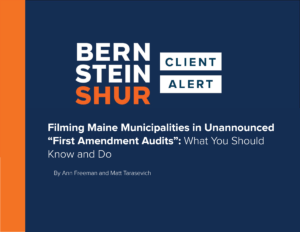Filming Maine Municipalities in Unannounced “First Amendment Audits”: What You Should Know and Do

By Matt Tarasevich and Ann Freeman
A person walks unannounced into a municipal building (Town Hall, the public library, the public works building, the recreation center, etc.) and begins filming employees. The person refuses to say who they are, why they are there, or what they are doing. They start asking questions of employees, or make comments to or about employees, sometimes in a goading or insulting manner. The video (or edited portions) later appears on YouTube or some other social media site, along with derogatory commentary about the municipal employees. What do you do?
This has happened and is happening in Maine. Colloquially referred to as a “First Amendment Audit,” these events are designed to test municipal officials and employees in their understanding of citizens’ rights in public buildings. Municipal employees are often surprised by the activity, and may overreact or demand that the person leave or cease recording. This may be exactly the reaction the person recording seeks. This activity is generally legal if conducted in an open public space or area. Because it is legal, public employees need to know how they should—and should not—react.
Here are a few recommendations:
- Not all areas of public buildings are open to the public. Certain areas of public buildings contain confidential, private and non-public records, or are work areas not open to the public (for example, the area behind the service counter). Review your workspace, and then clearly designate the appropriate areas by signage or other means as non-public. The person(s) filming (or any other members of the public) should not be allowed to enter those areas.
- Even if areas are properly designated as non-public, people may be able to film into those areas. Ensure that confidential non-public records are not openly displayed and are stored in a manner that will not expose them to inadvertent public disclosure. Likewise, employee work areas that can be seen by the public should not contain personal items which they do not want the general public to observe.
- Train employees to expect these events, and how to properly react:
1) Do not tell people that they cannot film or instruct them to leave the building. They likely have the right to be there and to record.
2) Be polite and professional—even if the inquisitor is not. The person’s goals may be to provoke a reaction that they can then record and publish. Do not give them what they seek.
3) Do not escalate the situation. Be factual and truthful. If they ask for information that any other person would be entitled to receive, provide it in the same professional manner as you would for any other citizen.
4) If they make a Freedom of Access Act request (FOAA), treat it in the same manner as you would for any other person. Remember, you are not required to provide answers to questions or create records—you are required to provide those existing “public records” as may be defined under the statute.
5) Do not ignore other customers or citizens who are there to receive municipal services. If a customer is uncomfortable with being recorded, ask that person if you can call them back, or help them later.
Finally, if the person is threatening or interfering with public business, you can involve supervisors or the police. Understand, however, that this should be the last resort since the person’s goal may be to get the municipality to overreact and create a legal claim for violation of the person’s constitutional rights.
Next steps for municipalities:
If you have questions about how to deal with a so-called “First Amendment Audit,” please contact Labor and Employment attorneys Matthew Tarasevich at mtarasevich@bernsteinshur.com or Ann Freeman at afreeman@bernsteinshur.com.
